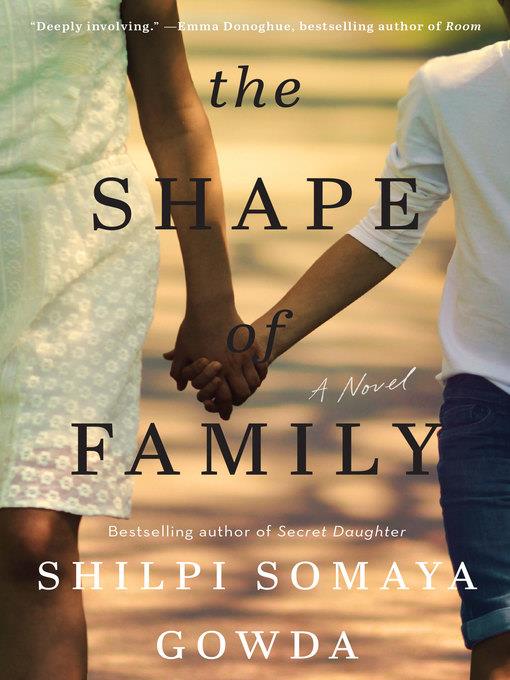
The Shape of Family
A Novel
کتاب های مرتبط
- اطلاعات
- نقد و بررسی
- دیدگاه کاربران
نقد و بررسی

January 15, 2020
After calamity strikes, the members of the Olander family struggle to find their paths back to each other. The children of an American father and an Indian mother, Karina and Prem Olander have learned to stick together. Thirteen-year-old Karina defends Prem, 8, from school bullies and even walks hand in hand with him on the way home, but she wants her time alone, too. Pushing Prem away one afternoon so that she can spend time trying on makeup and talking to her best friend, however, leads to a deadly accident. With each chapter telling the story from a different family member's perspective, Gowda (The Golden Son, 2016, etc.) traces the fallout lines with compassion and a keen eye for the lies we tell ourselves to avoid facing our own demons. While Prem watches from someplace after death, his and Karina's parents split up, with their father, Keith, submerging himself in his work in the financial industry and making some ethically questionable decisions. Their mother, Jaya, drifts away from everyone, rediscovering her spirituality, spending hours in ritualized prayer, building a temple in the family's home, and following the teachings of a prominent Hindu guru. With Prem's chapters underdeveloped, Gowda focuses primarily on Karina, tracing her spiral first into depression and then into self-destructive behavior. Once she leaves for college, Karina is primed to fall in love, to be betrayed, and to find solace at the Sanctuary. A communal farm headed by the charismatic Micah, the Sanctuary offers Karina meaningful work surrounded by people who embrace her, bearing witness to her sense of guilt. But as Karina begins to suspect that Micah may not be quite who he claims to be, Gowda ratchets up the tension, shifting gears into a thriller late in the game, setting in motion the family's reunion. A deft, patient portrait of grief.
COPYRIGHT(2020) Kirkus Reviews, ALL RIGHTS RESERVED.

January 27, 2020
Gowda’s evocative if predictable follow-up to The Golden Sun examines how a family deals with the loss of a child. In a California suburb, Karina spends her high school years blaming herself for the drowning death of her eight-year-old brother, Prem, when she was a preteen looking after him. Jaya, her mother, born in India but raised internationally as her diplomat father traveled the world, finds solace by returning to her Hindu religious roots. Karina’s father, Keith, a Lutheran-raised Philadelphian, buries himself in high-pressured financial work. Karina turns her misery inward, finding release in cutting herself and obsessing over school. While Gowda’s handling of teen self-esteem issues tracks a well-trodden path, a parallel between Jaya’s sudden dedication to an Indian guru and Karina’s involvement with a utopian commune after she goes off to college adds texture. Descriptions of the adversity faced by the children at school for being “mixed” are also done well. In chapters alternating among Karin, Jaya, and Keith, Gowda skillfully unpacks the family’s tension and trauma, though the conclusion comes too quickly, and mawkish entries narrated by Prem are a major drawback. No one but the reader hears the dead brother’s superfluous assurances that Karina wasn’t at fault for his death. There’s a lot of potential here, but too much of it is unmet.

February 1, 2020
The Olanders weren't a perfect family, but they were a unit. Jaya, the daughter of an Indian diplomat, and her husband, Keith, built a life for their two children, Keith taking pride in his ability to provide after his serial-entrepreneur father had taken his family through unpredictable periods of boom and bust. But one day, the unthinkable happens: the Olanders lose their 8-year-old son in a tragic accident, for which his 13-year-old sister, Karina, blames herself. In the years that follow, the Olanders are split apart, living mostly separate lives around the gaping wound in the center of their family. As Keith pours his energy into work that begins to hover at the edge of legality, Jaya dedicates herself to her spirituality, transforming their son's room into a shrine. Karina, meanwhile, must navigate young adulthood with the burden of guilt, begging for quiet relief, eventually trying to find refuge at a collaborative commune. Rendered with compassion, this is a compelling testament to a family's struggle to find solace.(Reprinted with permission of Booklist, copyright 2020, American Library Association.)

























دیدگاه کاربران